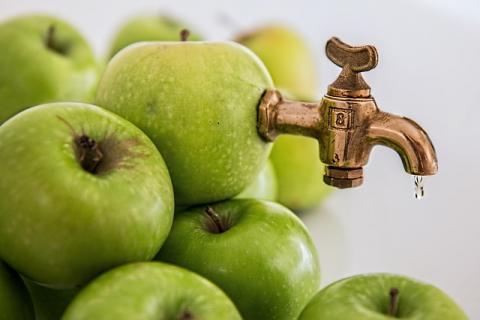
Apple Cider Vinegar (ACV) has been dubbed the miracle solution by many, from holistic healers and practitioners of natural medicine, to the old timers who know the backwoods remedies. It is easy to make, only takes 3 basic ingredients, serves so many purposes, and can be stored indefinitely. Some people choose to pasteurize their ACV to be sure it will keep, while others do not find this step necessary. I suppose it is up to the individual; just be sure and do your own research. ACV can be used as medicine for humans and animals, for cooking, for cleaning, for disinfecting, and for preserving various produce.
How To Make ACV
Ingredients & Supplies
- Whole Apples (cut into small pieces) OR Apple Scraps (the leftover core and peels)
- 1 Tablespoon Sugar/Raw Organic Honey for every 1 cup of water used
- Water
- Glass Jars
The amount of apples, water, and sugar will vary depending on how much you are making. I usually make a quart at a time, unless I'm making pie -- then I make a pint or a little less. It also makes a difference what size the apples are. On average I use anywhere from 5 – 15 apples. If you are only using scraps you will of course need a little more.
Directions
- Fill a sterile jar ¾ of the way full with apples.
- Mix sugar and water, in a separate container, until the sugar is mostly dissolved.
- Pour the water/sugar mixture over the apples, making sure to have them fully submersed BUT leave a couple of inches between the liquid and the top of the jar.
- Cover with a coffee filter, cheese cloth, or other breathable fabric.
- Store in a warm, dark place that stays between 60-80 degrees Fahrenheit for 2 weeks, stirring the mixture daily. It must be kept in the dark because UV light will destroy the fermentation process, and the stirring helps oxygen reach the liquid.
- After 2 weeks, strain off the ACV into another jar and set it aside once more for another 4-6 weeks. You will know it's done when it smells like vinegar and the sediment has settled. Give it one final strain and then you can store it for later use.
Here are a few quick tips: Using honey in place of the sugar is healthier in many aspects, but the fermentation process will take longer. If your ACV starts to get scum buildup or you see any signs of mold or mildew, simply scrape it off of the top; it is a normal reaction. Vinegar and apple cider vinegar have an indefinite shelf life due to the fermentation process. Because of the acidic properties, the vinegar is used as a natural preservative, among many other things.
So you know how it's made and how long it can be stored -- now let's talk about its many uses.
Uses for ACV
- To treat ringworm – on humans and animals, both.
- For cooking.
- As a cough and cold remedy.
- To treat sore throats.
- As medicine and an immunity booster for animals
- To make vinaigrette dressing.
- For cleaning – A 1:1 ratio of vinegar to water can be added to other natural cleansers, such as lemon juice, alcohol and essential oils.
- As a healing tonic for various ailmants: 2 tbsp. ACV, 1 tbsp. raw honey, 1 tsp. cinnamon.
- To wash produce.
- To unclog drains – Mix a ½ cup of baking soda with one cup of ACV. Quickly pour it down the drain and it will foam up, removing the clog.
- As various medicines. Combining different ingredients to the ACV will make different forms of natural medicines. Things like garlic, cloves, honey and cinnamon are all commonly used to treat various ailments.
This list is just a sampling; there are literally hundreds of ways to use ACV. It is cheap and easy to make and a lot of people already have what it takes to make it in their kitchen. Knowing how to utilize the precious gifts given by Mother Nature is a blessing – now stop throwing those apple scraps in the trash and make some medicine.








